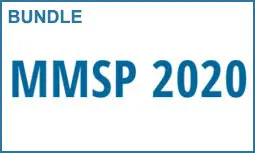Distortion Specific Contrast Based No-Reference Quality Assessment of DIBR-Synthesized Views
Sadbhawna Thakur, Vinit Jakhetiya, Deebha Mumtaz, Sunil P. Jaiswal
-
Members: FreeSPS
IEEE Members: $11.00
Non-members: $15.00Length: 10:08
23 Sep 2020
In the literature, many 3D-Synthesized Image Quality Assessment (IQA) algorithms are proposed, which are based on predicting the geometric and structural distortions present in the synthesized datasets. With the exponential growth of accurate inpainting algorithms, certain types of distortions, such as Black-holes, has become obsolete. Unfortunately, the existing IQA algorithms are mainly concentrating on efficiently identifying these black holes and subsequently predicting the perceptual quality of 3D synthesized views. The performance of these algorithms is quite weak in the recently proposed IETR dataset. Towards this end, we propose a new completely blind IQAalgorithm, which is based on the following key observations: 1. Distortions such as blurriness, blockiness (compression artifacts), and fast fading (object shifting) primarily affect the perceptual quality of 3D-synthesized views. 2. The perceptual characteristics of natural and synthetic synthesized views are quite different; distortions in natural views are perceptually more sensitive than the former. 3. Human Visual System’s (HVS) ability to access the perceptual quality of an image also depends on some other properties of the images, such as contrast. All these observations are integrated into the proposed algorithm named Distortion-Specific Contrast-Based (DSCB) IQA. Various experiments validate that the proposed DSCB IQA efficiently competes for with human perception and exhibits substantially better results (at least 17% gain in terms of PLCC) when compared to the existing IQAs.



